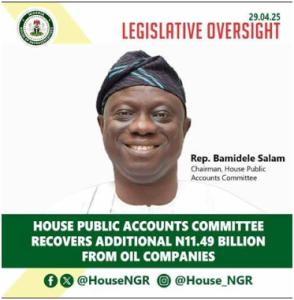House PAC Recovers ₦61.5bn in 10 Months — Oil Firms, MDAs Under Scrutiny
By the IDNN Political Economy Desk
The House of Representatives Public Accounts Committee (PAC) says it has recovered a total of ₦61.5 billion from non-compliant oil companies and government entities in under a year — the result of forensic audit enforcement, renewed political will, and inter-agency collaboration.
The development marks one of the most aggressive financial compliance drives in recent Nigerian legislative history.
₦11.5 Billion in Fresh Recoveries

Speaking in Abuja on Tuesday, PAC Chairman Bamidele Salam announced that ₦11.5 billion was the latest sum recovered during the committee’s ongoing review of audit queries issued by the Auditor-General of the Federation.
“These recoveries were made without fanfare, but they are critical to our nation’s fiscal health,” Salam said. “We are using due process and firm oversight, not drama, to enforce accountability.”
Where the Money Came From
While Salam did not publicly name all the affected companies, insider sources confirmed that:
-
At least 9 oil and gas operators were involved in the most recent ₦11.5bn settlement
-
3 major ministries failed to respond to previous audit queries and were hit with financial penalties
-
One publicly traded firm voluntarily refunded over ₦3.2 billion after a reconciliation process in March 2025
Breakdown (estimated):
Oil sector: ₦8.9bn
MDAs: ₦2.1bn
PPP Contracts: ₦500m
Pattern of Violations
The infractions, according to PAC reports, include:
-
Unremitted tax deductions
-
Inflated contract claims
-
Unaccounted capital expenditure
-
Non-response to audit queries
Salam noted that many infractions date as far back as 2017 but only gained traction under the committee’s renewed post-2023 audit enforcement push.
What’s Coming Next
In what may trigger industry-wide anxiety, PAC has now issued final compliance deadlines to dozens of additional firms and agencies. Failure to meet repayment terms could lead to:
-
Public disclosure (naming and shaming)
-
Legal action
-
Blacklist recommendations to the Federal Executive Council
Salam also announced plans to table a public compliance bulletin before the next recess, listing major audit offenders across sectors.
Bigger Picture: Audit Enforcement as Fiscal Recovery
This recovery effort comes at a time when the Nigerian government is battling revenue shortfalls and mounting debt obligations. The Tinubu administration’s 2025 Budget, currently set at ₦54.2 trillion, depends heavily on internally generated revenue (IGR) and efficiency reforms.
Observers say PAC’s strategy is becoming a silent pillar of non-oil revenue generation.
Analysis: Can Parliament Deliver Long-Term Accountability?
While PAC’s actions are being applauded, policy experts warn that legislative enforcement must be paired with:
-
Judicial convictions
-
Independent audit funding
-
Whistleblower protection mechanisms
-
Real-time audit digitization
“If these recoveries vanish into dark spending,” says policy analyst Kelechi Agu, “we’re back to zero. What matters now is where the recovered ₦61.5bn actually goes.”
Final Word
From ₦0 to ₦61.5 billion in less than 10 months — this is what legislative accountability looks like when backed by law, data, and zero tolerance.
But the question remains:
Is Nigeria ready to move from recovery to reform?
